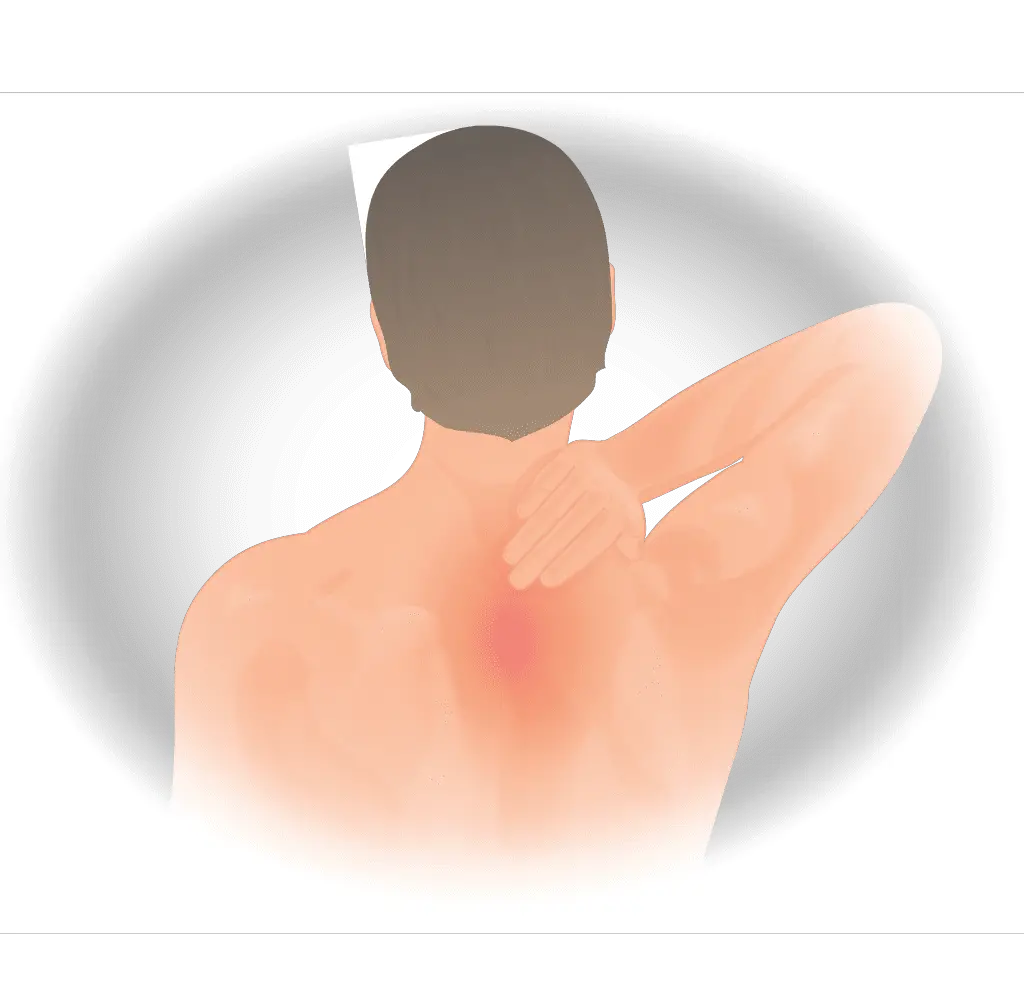If you’re like most people, you’ve probably experienced stabbing upper back pain at some point in your life. But what exactly causes this pain? Is it something you should be worried about?
We’ll explore the causes of stabbing upper back pain and what you can do to ease the discomfort. So whether you’re looking for answers or just want to commiserate, read on!
Contents
Common Causes of Stabbing Upper Back Pain
Sharp upper back pain is not as common as lower back pain but can be just as debilitating. If you’ve ever experienced a sudden, sharp pain in your upper back, you know how much it can immobilize you. But what causes this type of pain?

There are a few specific causes of stabbing upper back pain, but the most common is a mechanical problem with the spine. When something goes wrong with the bones, joints, or muscles in the back, it can cause sharp pain.
Another common cause of sharp back pain is an injury. This could be something like a muscle strain from lifting something heavy or a slipped disc. Either way, an injury can cause inflammation and pain.
Less common causes of stabbing upper back pain include things like shingles, tumors, and infection. These are all serious conditions that need to be treated by a doctor. If you’re experiencing sharp back pain, the best thing to do is to see a doctor so they can determine the cause and prescribe the appropriate treatment.
Muscle Spasms
Muscle spasms are sudden, prolonged contractions of a muscle or group of muscles. They often occur as a result of injury or overuse and can cause sharp pain in the affected area.
While any muscle can go into spasm, back muscles are particularly susceptible. This is because they work hard to support the spine and maintain good posture. When they become fatigued or overworked, they can go into spasms in an attempt to protect themselves from further injury.
There are several things that can trigger a muscle spasm, including:
- Dehydration
- Mineral depletion
- Poor nutrition
- Muscle fatigue
- Stress
- Cold weather
If you experience a muscle spasm, it is important to drink plenty of fluids and get some rest. Gently stretching the affected muscle may also help. If the pain is severe or does not improve after a few days, you should see your doctor for further evaluation.
Herniated Disk
A disk herniation occurs when the outer ring of the disk bulges out or ruptures. This can happen due to a heavy object pressing down on the disk, or from an overly strenuous or improper lifting motion that puts too much stress on the disk. A herniated disk is a common cause of sharp back pain.
The symptoms of a herniated disk can vary depending on the location and severity of the injury.
However, common symptoms include:
- Sharp back pain that may radiate down into the buttocks or legs
- Numbness or tingling in the affected area
- Weakness in the legs
If you think you may have a herniated disk, it’s important to see a doctor for an accurate diagnosis. They will likely recommend a combination of rest, ice/heat therapy, and over-the-counter pain medications. In some cases, physical therapy or surgery may be necessary.
Compression Fracture
Compression fractures in the spine can occur when the spine bones are weakened by a blow or other impact, such as from a car accident. The bones may be unable to support the weight of the upper body, causing them to compress or collapse. This can lead to very sharp, stabbing pain in the upper back.
Infection
There are several potential causes of upper back pain, and new or worsening symptoms may point to an infection. An infection can cause a number of other symptoms in addition to back pain, so it’s important to see a doctor if you think you may be infected. A rare condition called scrub typhus can also cause back pain, as well as a high fever and other symptoms.
Other Causes of Sharp Back Pain
A very minor fall or sudden jerk can cause sharp back pain if there is an underlying condition. This type of pain is also called “muscle strain”. It commonly affects the lower back and neck region. However, if the pain is due to a more serious condition, it can be a sign of progressive weakness. Therefore, it is always best to get medical attention for any kind of back pain.
Other causes of sharp back pain can include:
- A kidney infection
- A splenic artery aneurysm
- Aortic dissection
- Cauda equina syndrome
- Inferior vena cava thrombosis
- Kidney stones
- Pancreatitis
- Spinal cord compression
- Testicular torsion
While some of these causes are very serious, others may have apparent causes, such as bladder control issues or constipation.
Other symptoms that may accompany this type of pain include:
- Fever
- Nausea/vomiting
- Abdominal/flank pain
- Progressive weakness in the legs
If you experience any of these symptoms along with extreme sharp back pain, it’s important to seek medical attention right away as they could be indicative of a more serious condition.
Common Upper Back Pain Symptoms
Common upper back pain symptoms include:
- Pain that gets worse with certain activities, such as bending or reaching
- Muscle aches and stiffness
- Moderately heavy lifting
- Sitting in one position for a long time
If you have any of these symptoms, it’s important to see a doctor to find out the cause. In some cases, upper back pain is caused by a muscle or joint problem. In other cases, it may be caused by a problem with the spine.
Sharp Pain
Sharp pain is typically described as a stabbing sensation that is excruciating and usually felt in one spot. It can also radiate across a region. Sharp upper back pain is often the result of an injury, such as a muscle strain or sprain, but it can also be the symptom of a more serious condition, such as spinal stenosis or pinched nerves. If you experience sharp pain in your upper back, it is important to see a doctor to determine the cause.
General Discomfort
upper back pain can be caused by a number of things. First, it could be something as simple as bad posture. Slouching puts extra strain on the muscles and ligaments in your back, and over time, this can lead to pain.
Second, you might have a minor injury in the nearby area that is causing referred pain — meaning the pain is coming from another area but is felt in your upper back.
Finally, you could have a more serious underlying health condition such as arthritis or a herniated disc. If you’re not sure what’s causing your upper back pain, it’s best to see a doctor for an evaluation.
Frequently Asked Questions
What are the most likely causes of upper back pain?
The most likely causes of upper back pain are muscle strains, ligament sprains, and joint dysfunction.
How do you relieve upper back pain?
There are a number of ways to relieve upper back pain, including:
- Applying ice or heat to the affected area
- Taking over-the-counter pain medication
- Doing stretches or exercises designed to relieve back pain
- Seeing a chiropractor or other healthcare professional for treatment
What can cause stabbing pain?
There are many possible causes of stabbing back pain, including but not limited to: muscle strain, a herniated disc, spinal stenosis, and degenerative disc disease.
pain, back, symptoms, spine, muscle, doctor, muscles, nerve, heart, causes, shoulder, treatment, people, cause, injury, body, neck, condition, health, person, chest, time, right, side, attack, lung, home, blades, disc, strain, area, cases, blood, surgery, cancer, therapy, medications, posture, discs, nerves, shoulder blades, upper right, heart attack, back pain, upper back, pinched nerve, muscle strain, lung cancer, left side, thoracic spine, poor posture, chest pain, physical therapy, possible causes, spinal cord, common cause, sharp stabbing pain, pulmonary embolism, chronic pain, physical therapist, sharp pain, home remedies, few days, spinal column, pain symptoms, medical advice, neck pain, back muscles, spinal infection
Conclusion
There are many possible causes of sharp upper back pain, and often the exact cause is not known. However, there are some simple treatment solutions that can often provide relief. If the pain is severe or persists for more than a few days, it is important to see a doctor to rule out any serious underlying conditions.

Alan Walker is an author, researcher, and contributing writer at Spine Institute NY. He is a typical introvert, coffee fanatic, and freelancer.”

